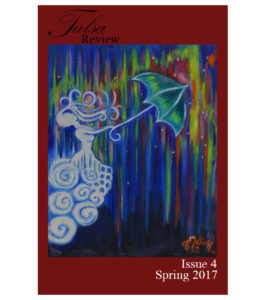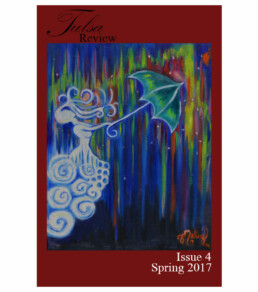2017 Issue 4

2017 Issue
Contents
Masthead
Managing Editor
Josh Parish
Executive Editors
Briann Piguet
Ryan Riley
Poetry Editors
Kaylie Cotten
Andrea Miller
Elizabeth Ray
Prose Editors
Rebekah Michael
Elizabeth Young
Webmaster & Logo Design
Jason Oehlberg
Advisory Committee
Mary Cantrell (Southeast Campus)
Allen Culpepper (Southeast Campus)
Sloan Davis (Northeast Campus)
Kasty France (Southeast Campus)
Carol Johnson (Southeast Campus)
Josh Parish (Metro Campus)
Jeanne Urie (Metro Campus)
Contact us
Tulsa Review, c/o Tulsa Community College
School of Liberal Arts and Communications, MC-423
909 S. Boston Ave.
Tulsa, OK 74119
tulsaccreview@gmail.com
Letter from the Editor
You’ve probably heard that truth and the Internet are having relationship troubles right now. Fake news. Alternative facts. Sometimes, part of me thinks that maybe there are just too many people writing—that of all the voices on the stage, the loudest, dumbest ones always seem to get the most attention. Maybe.
When I started to college, I loved a short poem by E.B. White that I found in a book borrowed from a friend. Back then, this was still the usual way for a person to discover a poem by a dead person: in a book, that is, possibly even an edition proofread by the actual author, rather than online. The poem goes like this:
The critic leaves at curtain fall
To find, in starting to review it,
He scarcely saw the play at all
For watching his reaction to it.
At a time when I was being asked by some professors to do just such awful things to literature—criticize it, evaluate it, tie it to a chair and torture a confession out if it, as Billy Collins said—the poem seemed like good medicine to remember. The final line, especially, gives a concrete explanation why the critic has missed the point: he’s jumped over the experience of the play and landed in the muck of himself. It offers some nuanced instruction. Dangerous curves ahead, writer or reader, should you find yourself watching you when you ought to be experiencing the show.
I regret to report that the Internet has now killed this poem. Search for it online and you’ll see what I mean. At some point, a sleepy or lazy writer must have mistyped the last line by repeating the second line, and then uploaded the error to a website that collects quotations. Other websites obviously copied the sleepy writer’s version and reprinted it, so the first page of Google results for the poem shows link after link to this ugly thing, attributed to White:
The critic leaves at curtain fall
To find, in starting to review it,
He scarcely saw the play at all
For starting to review it.
Letting alone that the meter is now all screwed up, gone is the nuanced truth originally expressed in that final line. In its place are a clunky ending and a cruder insight: reviewing stuff, maybe even just thinking about stuff, is stupid. Judging by the number of people who have created inspirational memes (with the botched poem in block text over pastel backgrounds or soft-focus sunsets), this insight obviously resonates in some way. I don’t disparage people for finding some truth there. But it’s not E.B. White’s truth. It’s not E.B. White’s poem. And it’s sad to me to think these readers will only love the fraudulent version, never suspecting a much better ending ever existed. The truth has been trampled all over the place. The Internet can do that, sometimes.
But then there are places like our journal. These are quieter places, in the dark little corners of the Internet, without a dozen ads on every page or clickbait appealing to your lizard brain. There are many writers’ voices in this issue, too, but they have a different effect on the truth. They magnify it, rather than diminish it. You won’t find one “type” of writer here: young, old, experimental, traditional, etc. You also won’t find a recurring theme, unless it’s by coincidence; we didn’t set out to create one.
Read this issue and you’ll discover how big changes in life and love can come during the smallest moments, over breakfast sausage or with a toothbrush in one’s mouth. You’ll meet a wife who takes revenge on her abusive husband, and a son who finds a strange moment of communion with his father. You’ll travel to Berlin, to Florence, to Idaho, and to Highway 169. A bunch of different voices come together here, and the result is more truth, not less. More angles of its reflection. Real news.
A bunch of different people helped create this issue, too, and I need to thank them. First, the Tulsa Community College Foundation, for funding our contest prizes and launch party, and Metro Campus Provost Dr. Greg Stone, for funding the launch party as well. The planning and acquisition of supplies couldn’t have been done without major help from Margaret Harrison, Executive Assistant in the Metro Provost’s office. Our contest wouldn’t have been possible without the hard work of the already hard working TCC creative writing faculty, who judged the prose and poetry entries: Mary Cantrell, Dr. Allen Culpepper, Sloan Davis, Kasty France, Carol Johnson, and Jeanne Urie. Likewise, Dr. John Gibson and Dr. Greg Stone took time from their busy schedules to judge the visual art entries. Amy Rains from the Metro Writing Center was wonderful to work with as she and others selected poems from our submissions, now stenciled on downtown Tulsa sidewalks, for the Writing Centers Rain Poetry Project. Julie Luscomb, Associate Professor of Information Technology at the Southeast campus, was equally wonderful to work with in helping us to find our Webmaster from among her students.
Most importantly, thank you to the students who volunteered their time on our editorial staff. They selected all of the writing, outside of the contest winners, that you’re about to read: Executive Editors Ryan Riley and Briann Piguet; Poetry Editors Kaylie Cotten, Andrea Miller, and Elizabeth Ray; and Prose Editors Rebekah Michael and Elizabeth Young. A huge thank you to Jason Oehlberg, our Webmaster, for having spent countless hours overhauling our site, archiving past issues, and updating our logo. He’ll be on the job market soon, and someone will be wise to hire him.
Finally, thank you to all the writers and artists who submitted their work for our consideration.
There aren’t too many people writing. You just have to look a little harder for the truth. Now, read the issue, and enjoy the show.
Josh Parish
Assistant Professor of English
Managing Editor, 2017 Tulsa Review

